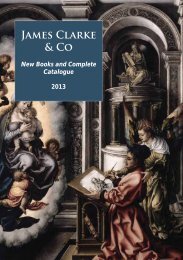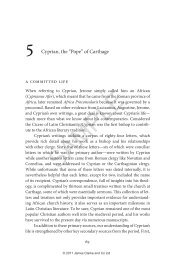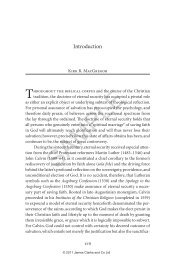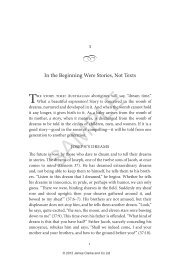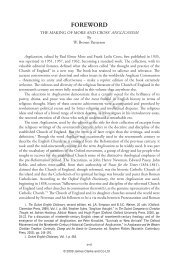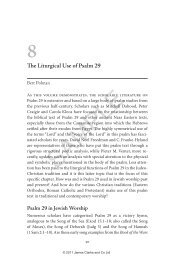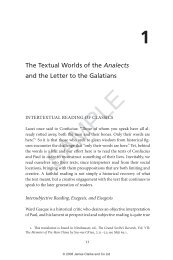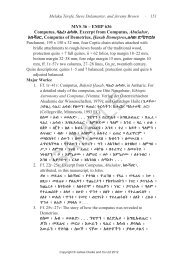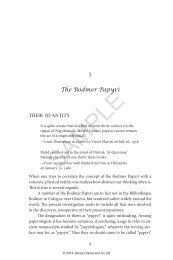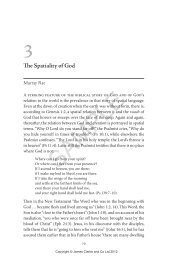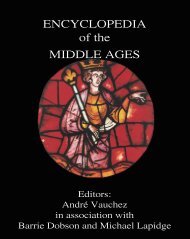Augustine's Conception of Deification, Revisited - James Clarke and ...
Augustine's Conception of Deification, Revisited - James Clarke and ...
Augustine's Conception of Deification, Revisited - James Clarke and ...
You also want an ePaper? Increase the reach of your titles
YUMPU automatically turns print PDFs into web optimized ePapers that Google loves.
Augustine’s <strong>Conception</strong> <strong>of</strong> <strong>Deification</strong>, <strong>Revisited</strong><br />
however, that while Augustine’s preoccupation during the Kalends festival<br />
was with the spiritual dangers <strong>of</strong> paganism, he did not elect to incorporate<br />
the “deificatio” logic <strong>of</strong> Dolbeau 6.<br />
Infrequency <strong>of</strong> <strong>Deification</strong> Imagery<br />
It is worth asking why Augustine so rarely turned to the use <strong>of</strong> the concept<br />
<strong>of</strong> deification. One clue to an answer may be found in his “magnum<br />
opus,” The City <strong>of</strong> God, wherein deification is discussed in its pagan context,<br />
<strong>and</strong> with unfavorable criticism. Here Augustine voices his intense<br />
displeasure with the practice <strong>of</strong> deifying—<strong>and</strong> then worshiping—men;<br />
one such example being that <strong>of</strong> Diomede, who was turned into a god<br />
after being credited with founding various towns <strong>and</strong> spreading Greek<br />
culture into Italy. 21 This sort <strong>of</strong> deification is a deception, Augustine argued,<br />
<strong>and</strong> amounts to the worship <strong>of</strong> false gods. In so doing, the “living God” is<br />
neglected; “temples, altars, sacrifices <strong>and</strong> priests” become devoted to “dead<br />
men” (XVIII.18) instead <strong>of</strong> their rightful recipient. One cannot escape<br />
from “the city <strong>of</strong> this world” <strong>and</strong> advance in faith, he warns, if one is<br />
captive to the practices <strong>of</strong> “Babylon.” Given the eagerness <strong>of</strong> the ancient<br />
Greeks <strong>and</strong> Romans to deify <strong>and</strong> worship their own, we can suppose that<br />
Augustine was especially cautious in using the language <strong>of</strong> deification in<br />
the Christian church, lest he mislead some into imagining that Christians<br />
themselves become equals <strong>of</strong> God Almighty. Moreover, Augustine was<br />
always wary to state unambiguously that the deified faithful do not become<br />
“God by nature” but rather “gods by grace.” Augustine achieves in Dolbeau<br />
6 a remarkable homiletic move: he can, on the one h<strong>and</strong>, deconstruct the<br />
pagan use <strong>of</strong> idols <strong>and</strong>, on the other, provide his own congregants food<br />
for thought on the interior life <strong>of</strong> the soul.<br />
Henry Chadwick, in his comments on the newly discovered sermons,<br />
has remarked, “two themes appear to be recurrent [in these sermons <strong>of</strong><br />
404]. The first is that true religion is inward <strong>and</strong> a matter <strong>of</strong> the heart . . . A<br />
second prominent theme is that true faith will issue in a reformed moral<br />
life.” 22 Augustine was first <strong>and</strong> foremost a bishop, a teacher <strong>and</strong> caretaker<br />
SAMPLE<br />
21<br />
The City <strong>of</strong> God, XVIII.16ff.<br />
22<br />
“New Sermons <strong>of</strong> Augustine,” Journal <strong>of</strong> Theological Studies, n.s. 47 (1996) 69–91.<br />
131<br />
© 2010 <strong>James</strong> <strong>Clarke</strong> <strong>and</strong> Co Ltd



